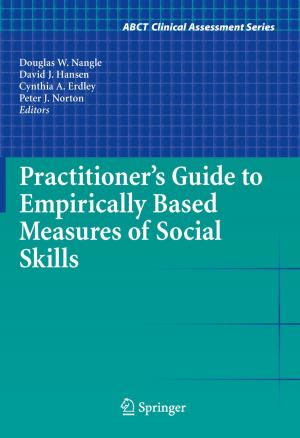Measurement for the Social Sciences
The C-OAR-SE Method and Why It Must Replace Psychometrics
Nonfiction, Social & Cultural Studies, Social Science, Methodology, Business & Finance, Marketing & Sales| Author: | John R. Rossiter | ISBN: | 9781441971586 |
| Publisher: | Springer New York | Publication: | November 25, 2010 |
| Imprint: | Springer | Language: | English |
| Author: | John R. Rossiter |
| ISBN: | 9781441971586 |
| Publisher: | Springer New York |
| Publication: | November 25, 2010 |
| Imprint: | Springer |
| Language: | English |
This book proposes a revolutionary new theory of construct measurement – called C-OAR-SE – for the social sciences. The acronym is derived from the following key elements: construct definition; object representation; attribute classification; rater entity identification; selection of item type; enumeration and scoring. The new theory is applicable to the design of measures of constructs in: • Management • Marketing • Information Systems • Organizational Behavior • Psychology • Sociology C-OAR-SE is a rationally rather than empirically-based theory and procedure. It can be used for designing measures of the most complex and also the most basic constructs that we use in social science research. C-OAR-SE is a radical alternative to the traditional empirically-based psychometric approach, and a considerable amount of the book’s content is devoted to demonstrating why the psychometric approach does not produce valid measures. The book argues that the psychometric approach has resulted in many misleading findings in the social sciences and has led to erroneous acceptance – or rejection – of many of our main theories and hypotheses, and that the C-OAR-SE approach to measurement would correct this massive problem. The main purpose of this book is to introduce and explain C-OAR-SE construct measurement theory in a way that will be understood by all social science researchers and that can be applied to designing new, more valid measures. Featuring numerous examples, practical applications, end-of-chapter questions, and appendices, the book will serve as an essential resource for students and professional researcher alike.
This book proposes a revolutionary new theory of construct measurement – called C-OAR-SE – for the social sciences. The acronym is derived from the following key elements: construct definition; object representation; attribute classification; rater entity identification; selection of item type; enumeration and scoring. The new theory is applicable to the design of measures of constructs in: • Management • Marketing • Information Systems • Organizational Behavior • Psychology • Sociology C-OAR-SE is a rationally rather than empirically-based theory and procedure. It can be used for designing measures of the most complex and also the most basic constructs that we use in social science research. C-OAR-SE is a radical alternative to the traditional empirically-based psychometric approach, and a considerable amount of the book’s content is devoted to demonstrating why the psychometric approach does not produce valid measures. The book argues that the psychometric approach has resulted in many misleading findings in the social sciences and has led to erroneous acceptance – or rejection – of many of our main theories and hypotheses, and that the C-OAR-SE approach to measurement would correct this massive problem. The main purpose of this book is to introduce and explain C-OAR-SE construct measurement theory in a way that will be understood by all social science researchers and that can be applied to designing new, more valid measures. Featuring numerous examples, practical applications, end-of-chapter questions, and appendices, the book will serve as an essential resource for students and professional researcher alike.















